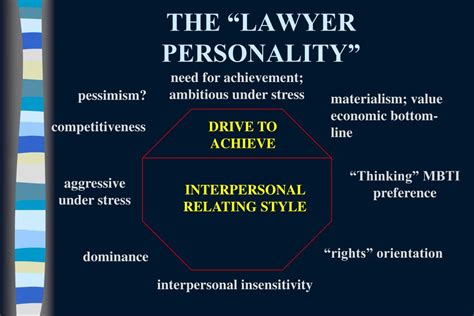Introduction

The legal profession is a diverse one, attracting individuals from all walks of life. However, certain personality traits are more common among successful lawyers. Understanding these personality types can provide valuable insights into the skills and motivations of those who excel in the field.
Analytical Thinkers
Lawyers are expected to be logical and analytical thinkers. They must be able to identify key issues, analyze evidence, and synthesize information to build a strong legal argument. According to the Law School Admission Council (LSAC), analytical reasoning skills are consistently ranked as the most important attribute for first-year law students.
Effective Communicators
Lawyers must be able to communicate effectively both verbally and in writing. They must be able to clearly articulate complex legal concepts to clients, judges, and opposing counsel. Studies show that lawyers with strong communication skills earn higher incomes and have greater job satisfaction.
Problem Solvers
Lawyers are often faced with complex problems that require creative solutions. They must be able to think outside the box and develop innovative strategies to overcome legal obstacles. The American Bar Association (ABA) emphasizes the importance of problem-solving skills for lawyers, noting that they are essential for success in negotiation, litigation, and other legal matters.
Persuasive Advocates
Lawyers are expected to be persuasive advocates. They must be able to present their case effectively in court or during negotiations. According to the National Association for Law Placement (NALP), persuasive skills are in high demand among law firms and government agencies.
Detail-Oriented
Lawyers must be detail-oriented and attentive to even the smallest of details. They must be able to review contracts, pleadings, and other legal documents thoroughly to identify potential errors or inconsistencies. A recent survey by LexisNexis found that lawyers who are detail-oriented are more likely to achieve favorable outcomes for their clients.
Additional Personality Traits
In addition to these core personality traits, successful lawyers also often possess:
- Strong work ethic
- Dedication to the pursuit of justice
- Empathy for others
- Resilience
- Cultural awareness
- Emotional intelligence
Motivations
Understanding the motivations of lawyers can also provide insights into their behavior and career choices. Common motivations include:
- A desire to help others
- A passion for intellectual challenges
- A drive to achieve success
- A desire to make a difference in the world
Strategies for Success
Aspiring lawyers can develop the necessary personality traits and motivations through a combination of education, experience, and self-reflection. Effective strategies include:
- Enrolling in law school or completing a paralegal program
- Gaining practical experience through internships or clerkships
- Seeking mentorship from experienced lawyers
- Engaging in professional development activities
- Reflecting on personal strengths and weaknesses
Conclusion
By understanding the personality types and motivations of successful lawyers, individuals can better prepare themselves for the challenges and rewards of the legal profession. Developing the necessary skills and attributes through education, experience, and self-reflection can increase the likelihood of success in this demanding but fulfilling field.
Table 1: Common Personality Traits of Successful Lawyers
| Trait | Description |
|---|---|
| Analytical Thinker | Ability to identify key issues, analyze evidence, and synthesize information |
| Effective Communicator | Ability to clearly articulate complex legal concepts both verbally and in writing |
| Problem Solver | Ability to think outside the box and develop innovative strategies |
| Persuasive Advocate | Ability to present a strong case in court or during negotiations |
| Detail-Oriented | Ability to review contracts, pleadings, and other legal documents thoroughly |
Table 2: Motivations of Lawyers
| Motivation | Description |
|---|---|
| Desire to Help Others | Lawyers are often motivated by a desire to make a difference in the world and help those in need. |
| Passion for Intellectual Challenges | Lawyers enjoy the intellectual challenges of analyzing complex legal issues and developing creative solutions. |
| Drive to Achieve Success | Lawyers are often driven to achieve success and recognition in their field. |
| Desire to Make a Difference | Lawyers often seek to make a positive impact on society through their work. |
Table 3: Strategies for Developing Necessary Personality Traits
| Strategy | Description |
|---|---|
| Education | Enrolling in law school or completing a paralegal program can provide a strong foundation in legal knowledge and skills. |
| Experience | Gaining practical experience through internships or clerkships can help aspiring lawyers develop their analytical, communication, problem-solving, and advocacy skills. |
| Mentorship | Seeking mentorship from experienced lawyers can provide valuable guidance and support. |
| Professional Development | Engaging in professional development activities can help lawyers stay up-to-date on legal developments and improve their skills. |
| Self-Reflection | Reflecting on personal strengths and weaknesses can help aspiring lawyers identify areas for growth and improvement. |
Table 4: Pros and Cons of a Legal Career
| Pros | Cons |
|---|---|
| Intellectual Challenges | Long Hours |
| Job Security | High Stress |
| High Earning Potential | Highly Competitive |
| Opportunity to Make a Difference | Ethical Challenges |
